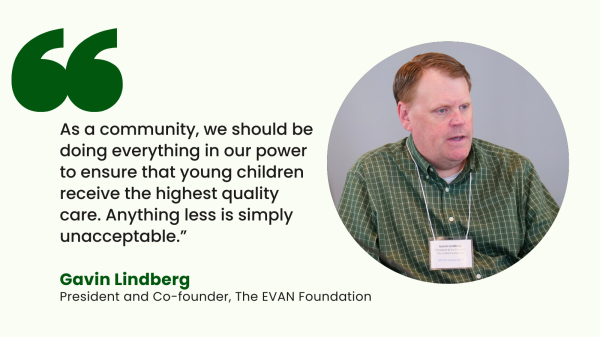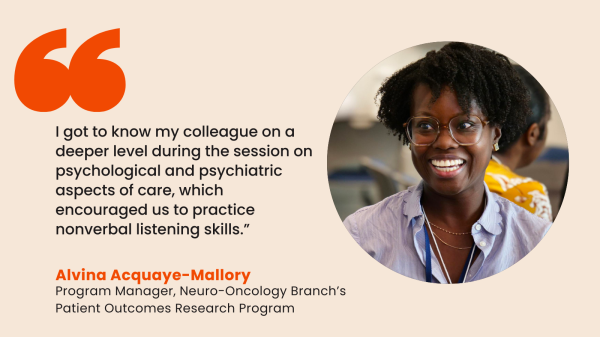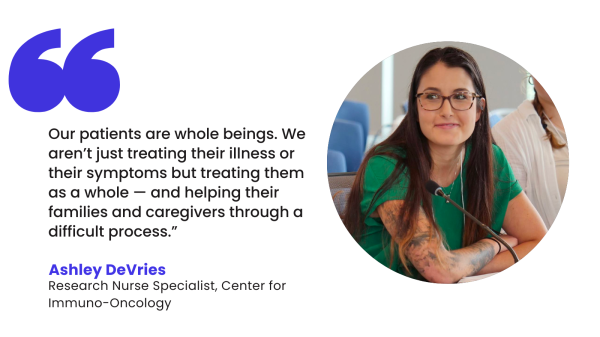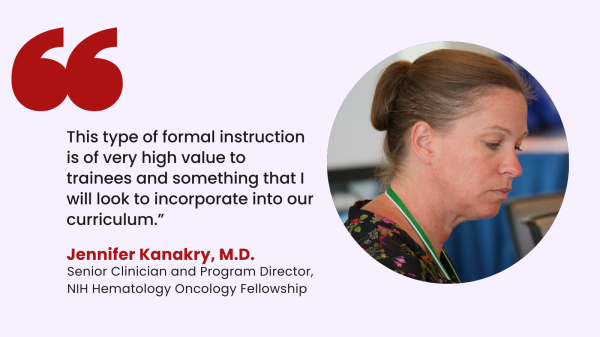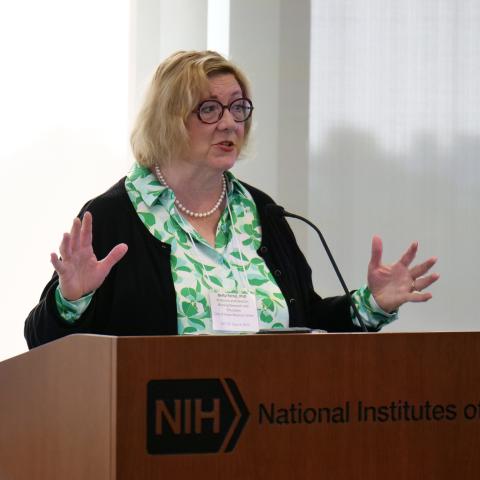
Betty Ferrell, Ph.D., Founder of the ICC Training Course.
In mid-July 2023, 24 healthcare providers working on transdisciplinary teams were selected from across CCR to participate in an Interprofessional Communication Curriculum (ICC) Training Course. The course consisted of didactic lectures and hands-on communication sessions to help participants enhance their communication skills in important but challenging patient care areas, such as the physical, psychological, cultural and spiritual aspects of both pediatric and adult patient care.
The ICC was developed in 2016 by Betty Ferrell, Ph.D., from City of Hope Medical Center and colleagues. Since then, the course has been taught globally to about 1,000 interdisciplinary clinicians. Dr. Ferrell is world-renowned for her expertise in the field of pain management, quality of life and palliative care.
“We are a premier cancer center, so we must strive to be premier cancer providers,” said Terri Armstrong, Ph.D., Deputy Chief of the Neuro-Oncology Branch and CCR Associate Director of Patient Outcomes, who co-led the course with Fatima Karzai, M.D., Clinical Director of the Genitourinary Malignancies Branch.
Communication is Key
Research shows that there is a lack of focus on communication skills training for clinicians, resulting in deficiencies in such skills related to the care of patients with serious illnesses like cancer. “Oncology is a multi-disciplinary specialty that requires providers to have a wide range of communication skills and be willing to discuss difficult topics,” Dr. Karzai said.
CCR Deputy Director James Gulley, M.D., Ph.D., emphasized that communication is a key component of quality cancer care. “People are our best resource here in CCR, and being able to work together is critically important,” he said.
Eight teams of cancer care providers from a wide range of specialty programs and settings were selected to participate. Each team included three members from the same branch or program, but across disciplines, including physicians, research nurses, advanced practice providers, social workers and clinical psychologists. These teams set goals based on needs identified in their area of practice and will work over the next year to achieve these goals.
Beyond Breaking Bad News
The ICC stresses that palliative care — specialized medical care for those living with a serious illness — is applicable across all stages of cancer. Though there are many different definitions, Dr. Ferrell defines palliative care as “the care that you or someone you love would want to receive if diagnosed with cancer.”
Dr. Armstrong added that this goal is aligned with CCR’s mission to improve the lives of all cancer patients by solving important, challenging and neglected problems in cancer research and patient care. “We do this by addressing the impact of cancer, by managing symptoms, providing emotional support and ensuring that the plan of care aligns with patient and family goals.”
Applying Newfound Communications Skills to Improve Patient Care
Lessons learned at the ICC Course are meant to be shared widely. Following a “train-the-trainer” model, the curriculum is designed for participants to teach the skills they’ve learned to colleagues in their respective branches, centers and offices, thus expanding the reach of the program.
“Our goal is not simply to bring people together and make them smarter,” Dr. Ferrell said. “Instead, it is to bring people together and give them knowledge, experience and resources so that they can go back and improve care for patients.”
Acknowledgements
The NCI ICC Course was co-sponsored by NCI-CONNECT (Comprehensive Oncology Network Evaluating Rare CNS Tumors), the Office of Patient-Centered Outcomes Research (OPCORe), the Office of Research Nursing (ORN) and the CCR Clinical Trials Diversity Equity and Inclusion Committee (CTDEI).
The NCI ICC Course was taught by Betty Ferrell, Ph.D., from City of Hope Medical Center; Myra Glajchen, D.S.W., from the MJHS Institute for Innovation in Palliative Care; the Reverend Trace Haythorn, Ph.D., former Executive Director of the Association for Clinical Pastoral Education; Judith Paice, Ph.D., from Northwestern University’s Feinberg School of Medicine; and Haley Buller, ICC Project Director at City of Hope Medical Center.
CCR faculty leaders were Terri Armstrong, Ph.D., Deputy Chief of the Neuro-Oncology Branch and CCR Associate Director of Patient Outcomes; Fatima Karzai, M.D., Clinical Director of the Genitourinary Malignancies Branch; Mark Gilbert, M.D., Chief of the Neuro-Oncology Branch and CCR Deputy Director; Arun Rajan, M.D., Senior Clinician in the Thoracic and GI Malignancies Branch; and Lori Wiener, Ph.D., Senior Associate Scientist in the Pediatric Oncology Branch.
Special guests were Gavin Lindberg, President and Co-Founder of The EVAN Foundation, and Kathleen Castro, a Nurse Consultant in the Office of the Associate Director of the Healthcare Delivery Research Program in the NCI Division of Cancer Control & Population Sciences.
